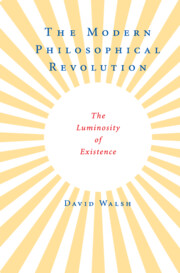Book contents
- Frontmatter
- Contents
- Preface
- Introduction
- 1 Kant's “Copernican Revolution” as Existential
- 2 Hegel's Inauguration of the Language of Existence
- 3 Schelling on the Beyond of Existence
- 4 Nietzsche: Philosophy as Existence
- 5 Heidegger's Achievement Despite the Betrayal of Philosophical Existence
- 6 Existence Without Refuge as the Response of Levinas
- 7 Derrida's Dissemination of Existence as Différance
- 8 Kierkegaard's Prioritization of Existence over Philosophy
- Epilogue: Modernity as Responsibility
- Works Cited
- Select Bibliography of Secondary Sources
- Index
3 - Schelling on the Beyond of Existence
Published online by Cambridge University Press: 05 June 2012
- Frontmatter
- Contents
- Preface
- Introduction
- 1 Kant's “Copernican Revolution” as Existential
- 2 Hegel's Inauguration of the Language of Existence
- 3 Schelling on the Beyond of Existence
- 4 Nietzsche: Philosophy as Existence
- 5 Heidegger's Achievement Despite the Betrayal of Philosophical Existence
- 6 Existence Without Refuge as the Response of Levinas
- 7 Derrida's Dissemination of Existence as Différance
- 8 Kierkegaard's Prioritization of Existence over Philosophy
- Epilogue: Modernity as Responsibility
- Works Cited
- Select Bibliography of Secondary Sources
- Index
Summary
The conventional picture of Schelling as the predecessor linking Hegel with Fichte and Kant has only recently begun to dissolve. Schelling's early prominence and the relative paucity of later publications provided some basis for this perception, although it required a neglect of the large body of posthumous writings that continued the existential meditation of philosophy after the death of Hegel. Now that view has become untenable in light of the trajectory that philosophy itself has followed. The position of Schelling as the crucial link between the idealists and the fragmented explorers of existence who followed has begun to be established. Of course, the attendance of Kierkegaard, Engels, Bakunin, Burckhart, and other luminaries at Schelling's Berlin lectures in the 1840s is well known, but its significance has not necessarily been absorbed. This is largely because these brilliant students all subsequently turned their backs on idealism to proclaim the necessity of returning to existence. In the dramatic impact of the gesture, we overlook the extent to which Schelling and, as we have suggested, Hegel pointed the way. If we think of Hegel as having demonstrated that philosophy can be understood only as a movement of life, that it is only in existence that the tensions are resolved, then Schelling is the one who established the definitive limits to our penetration of the process. Where Hegel was inclined to propound the completeness of the system even in the face of his own evident admission of its incompleteness, Schelling insisted that our very existence precludes the possibility of its systematic comprehension.
- Type
- Chapter
- Information
- The Modern Philosophical RevolutionThe Luminosity of Existence, pp. 130 - 177Publisher: Cambridge University PressPrint publication year: 2008



